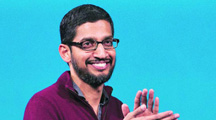
WASHINGTON: One of the reasons for Indian managers’ success is that they are future oriented, a leading American financial daily has said, with Google’s Sunder Pichai joining the fast expanding club of Indian-origin CEOs.
The elevation of Pichai, 43, as the CEO of Google, The Wall Street Journal reported is a reminder that the CEOs of some of the world’s most recognizable tech companies share origins from India.
“Indian managers are future-oriented, and had a paradoxical blend of genuine personal humility and intense professional will,” the Journal said, citing a recent study by Southern Hampshire University.
“These leaders achieved extraordinary results and built great organizations without much hoopla,” the daily said as it listed out the Indian origin executives that are heading top companies in the US.
“Nowhere, perhaps, is that more starkly on display than at Microsoft. Since taking over as CEO, Satya Nadella managed to achieve what had once seemed impossible: to make Silicon Valley like Microsoft again. He did so by embracing collaboration and not treating rivals’ products as enemies in some ways the opposite of his often-flamboyant predecessor, Steve Ballmer,” the daily reported.
While Indian managers are not in many cases the founders of the companies they lead, they are respected managers who have held numerous positions in their companies, working up the ranks, it said.
Adobe chief Shantanu Narayen, 53, according to the daily, has been described by colleagues as quiet but incredibly competitive. Since becoming CEO in 2007, he has led a dramatic transformation at the company, it added.
Sanjay Jha, the 52-year-old CEO of chipmaker Globalfoundries, had previously run Motorola Mobility and had served for years as a senior executive of Qualcomm, it said.
In another article, The Wall Street Journal said Pichai’s ascent reflects his ability to create strong products, including Google’s Chrome browser and later the Chrome operating system.
But it also shows his ability to identify competitive pressures, manage others and smooth over differences, both internally and with Google’s business partners, it said.
At Google, Pichai showed a flair for championing challenging but strategically important projects such as the Chrome browser, which today has 45 per cent market share globally, according to research firm Statcounter, up from one percent in early 2009.
His team later developed the Chrome operating system, which powers a line of cheap laptops that have proved popular in schools.
“He has this amazing, almost 12-year track record of being this guy that always launched things that people wanted,” said Wesley Chan, who handed over the Google Toolbar product to Pichai in 2004.
When Pichai assumes his new role later this year, he will oversee nearly all of the USD 66 billion in annual revenue of the soon-to-be-renamed Alphabet Inc. including the world’s leading online-advertising platform, the report said.
It further said that unlike some other Google executives, Pichai is a private man, not famous for racing sports cars or parachuting into Burning Man.
Pichai has become a public face of the company, acting as master of ceremonies for Google’s annual developer conference the past two years.
His new role expands his power even further, beyond the core product groups that he’d been assigned last year, and giving him authority over executives who had previously reported to Larry Page, including YouTube CEO Susan Wojcicki, Google General Counsel Kent Walker, and Don Harrison, head of corporate development, the report said. -PTI






